
Search
[{{{type}}}] {{{reason}}}
{{/data.error.root_cause}}{{{_source.title}}} {{#_source.showPrice}} {{{_source.displayPrice}}} {{/_source.showPrice}}
{{#_source.showLink}} {{/_source.showLink}} {{#_source.showDate}}{{{_source.displayDate}}}
{{/_source.showDate}}{{{_source.description}}}
{{#_source.additionalInfo}}{{#_source.additionalFields}} {{#title}} {{{label}}}: {{{title}}} {{/title}} {{/_source.additionalFields}}
{{/_source.additionalInfo}}Peirspictiochtai
The full title of this column is-?Peirspictiochtai Ar An Saol, which is Gaelic for Perspectives on Life, written by Richard McDonough. It will show up on Wednesdays, but the first one is coming on Wednesday, Jan. 10, 2024.

- Category: Peirspictiochtai
Peirspictiochtai Ar An Saol
Democracy Is At Stake
Part Four
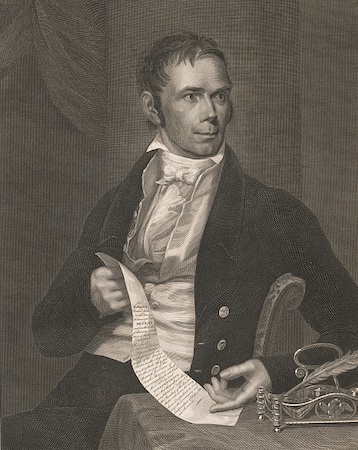 Henry Clay. (The engraving was produced by Peter Maverick and was provided courtesy of the Library of Congress, 1822.)
Henry Clay. (The engraving was produced by Peter Maverick and was provided courtesy of the Library of Congress, 1822.)
In July and September, Peirspictiochtai Ar An Saol noted how news media reports have been repeating a mantra that our democracy is threatened. That American democracy is at stake. That we have never faced such a situation.
These news media reports have continued in the weeks since.
The United States of America has faced situations before when election results were, let us say, "questionable."
As an example, imagine if an American citizen won the popular vote for President of the United States and that that same American citizen won more votes in the Electoral College than any other candidate. Yet, that American citizen did not become President of the United States.
Impossible?
No. This scenario has actually occurred.
It may be useful to consider what happened 200 years ago – what happened in 1824 and 1825 during the election of the President of the United States.

- Category: Peirspictiochtai
Peirspictiochtai Ar An Saol
Democracy Is At Stake
Part Three
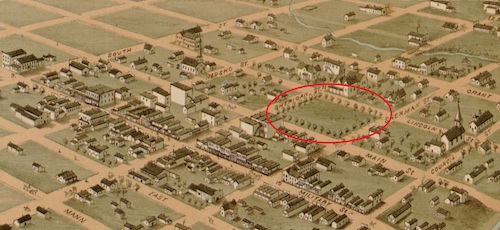 A birds-eye view of Baxter Springs shows the empty lot (in the red circle) between Sheridan and Sherman Streets as well as between Main and Lincoln Streets (three of these streets were renamed in later years) that would be the future site of the Cherokee County Court House (a building that was never actually used as a court house). (The image was provided courtesy of the Library of Congress, 1871.)
A birds-eye view of Baxter Springs shows the empty lot (in the red circle) between Sheridan and Sherman Streets as well as between Main and Lincoln Streets (three of these streets were renamed in later years) that would be the future site of the Cherokee County Court House (a building that was never actually used as a court house). (The image was provided courtesy of the Library of Congress, 1871.)
Last week, Peirspictiochtai Ar An Saol detailed some of the aspects involving elections in Cherokee County, Kansas, in the 1860s. Further details on why allegations of election fraud were made in this community are included in this edition of Peirspictiochtai Ar An Saol.

- Category: Peirspictiochtai
Peirspictiochtai Ar An Saol
Democracy Is At Stake
Part Two
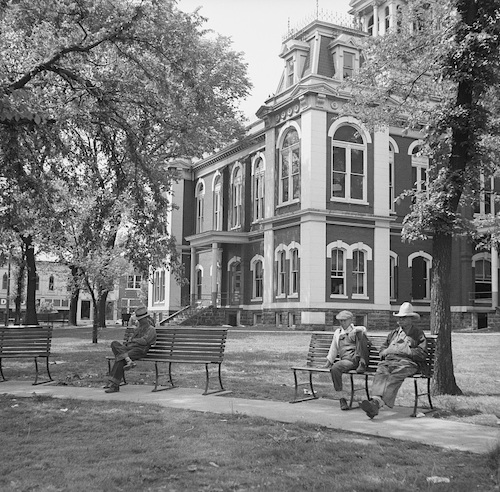 The Cherokee County Court House in Columbus, Kansas. (The photograph was produced by Arthur Rothstein and was provided courtesy of the Library of Congress, May of 1936.)
The Cherokee County Court House in Columbus, Kansas. (The photograph was produced by Arthur Rothstein and was provided courtesy of the Library of Congress, May of 1936.)
In July, Peirspictiochtai Ar An Saol noted how news media reports have been repeating a mantra that our democracy is threatened. That American democracy is at stake. That we have never faced such a situation.
These news media reports have continued in the weeks since.
The United States of America has faced situations before when election results were, let us say, "questionable."
As an example, it might be useful to look back on how elections took place in one county in one state.

- Category: Peirspictiochtai
Peirspictiochtai Ar An Saol
Democracy Is At Stake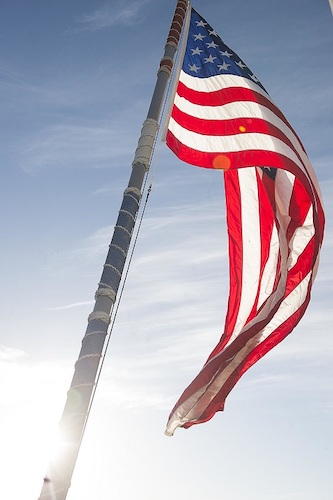 (The photograph was produced by Mass Communication Specialist 3rd Class Robert Price and provided courtesy of the United States Navy, June 4, 2017.)
(The photograph was produced by Mass Communication Specialist 3rd Class Robert Price and provided courtesy of the United States Navy, June 4, 2017.)
News media reports have been repeating a mantra that our democracy is threatened. That American democracy is at stake. That we have never faced such a situation.
Consider the following items from newspapers during the past century-and-a-half plus:
On July 2, 1856, the Cleveland Weekly Plain Dealer included a news article quoting from a speech given by Senator Stephen Douglas: "You all know that I am not indifferent in any contest where the success of the Democracy is at stake..."

- Category: Peirspictiochtai
Peirspictiochtai Ar An Saol
Juneteenth
Statements
Part Five
 Vice President Kamala Harris (The photograph was provided courtesy of The White House.)
Vice President Kamala Harris (The photograph was provided courtesy of The White House.)
During the past few days, Peirspictiochtai Ar An Saol detailed aspects of the history of emancipation of slaves in the United States of America. This edition of the five-part news series includes statements from our leaders and leading institutions in the United States of America regarding Juneteenth.
Recall that Juneteenth was not the first celebration of emancipation by freed slaves in the United States of America. African Americans who were emancipated by an act of the United States Congress held celebrations in the District of Columbia in 1862. This was more than three years prior to Juneteenth.

- Category: Peirspictiochtai
Peirspictiochtai Ar An Saol
Juneteenth
Emancipation Celebrations
Part Four
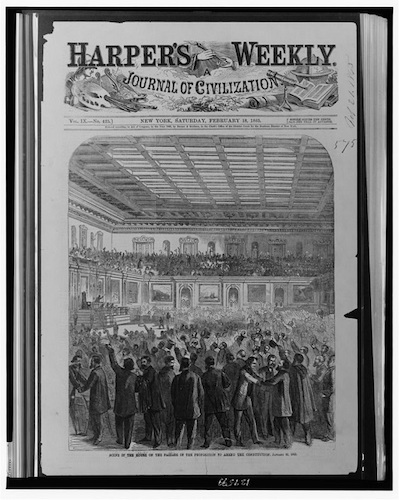 The scene in the U S House of Representatives on the passage of the proposition to amend the Constitution, according to the Library of Congress, on January 31, 1865. (The illustration was in Harper's Weekly and was provided courtesy of the Library of Congress, February 18, 1865.)
The scene in the U S House of Representatives on the passage of the proposition to amend the Constitution, according to the Library of Congress, on January 31, 1865. (The illustration was in Harper's Weekly and was provided courtesy of the Library of Congress, February 18, 1865.)
Slavery had been part of the United States of America from the birth of the country. In some cases, slavery was outlawed by official actions of individual states and commonwealths. In some cases, slaves were set free by their owners. In other cases, slaves bought their freedom from their owners.
(Those words may strike some as offensive. The dilemma is that at the time of legal slavery, human beings held in bondage were considered property. As offensive as it may seem, the reality was that human beings could – and did – own other human beings as property.)

- Category: Peirspictiochtai
Peirspictiochtai Ar An Saol
Juneteenth
Emancipation Celebrations
Part Three
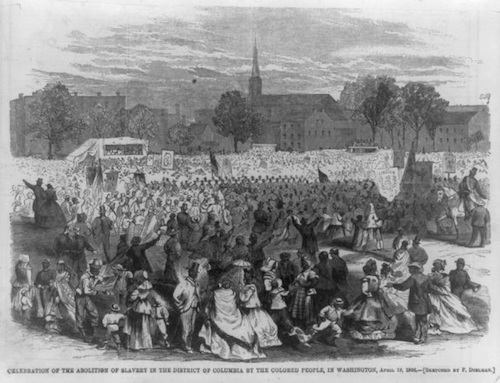 According to a statement from the Library of Congress, this sketch showed the "Celebration of the abolition of slavery in the District of Columbia by the colored people, in Washington, April 19, 1866." (The sketch was produced by F. Dielman, published on May 12, 1866, and provided courtesy of the Library of Congress.)
According to a statement from the Library of Congress, this sketch showed the "Celebration of the abolition of slavery in the District of Columbia by the colored people, in Washington, April 19, 1866." (The sketch was produced by F. Dielman, published on May 12, 1866, and provided courtesy of the Library of Congress.)
Some enslaved people in the United States of America had been freed from bondage by official actions of individual states and commonwealths prior to the American Civil War. The dates of the official actions as well as for the timing of emancipation varied for the different jurisdictions. In some cases, emancipation was based on the age of the human being held in bondage.
The Federal government also took official action to free enslaved people.
During the American Civil War, the United States Congress passed legislation that freed slaves in the District of Columbia. President Abraham Lincoln signed this legislation – The District of Columbia Compensated Emancipation Act – into law on April 16, 1862.
"It provided for immediate emancipation, compensation to former owners who were loyal to the Union of up to $300 for each freed slave, voluntary colonization of former slaves to locations outside the United States, and payments of up to $100 for each person choosing emigration," according to a statement from The United States National Archives and Records Administration (National Archives). "Over the next nine months, the Board of Commissioners appointed to administer the act approved 930 petitions, completely or in part, from former owners for the freedom of 2,989 former slaves."
Please note that according to a statement from the District of Columbia, 3,100 individuals held as slaves were set free through emancipation. Another report had the total number of persons freed to be closer to 3,200 people.
Please also note that when the law referenced individuals "choosing emigration," the law specifically mentioned emigration to two countries: "the Republics of Hayti [Haiti] or Liberia."
As word spread of their emancipation, newly-freed slaves celebrated in the District.
The Reading Daily Times (using language that reflected the times) reported on April 18, 1862, that the African Americans were celebrating the end of slavery in the District: "Celebration – The colored people of this city, will fire a hundred guns to-day, in honor of the passage and approval of the emancipation bill in the District of Columbia."
On April 23, 1862, the National Republican printed a front-page news article that was entitled "Emancipation In The District." Portions of this news article are as follows:
"The Washington correspondent of the New York Evening Post thus notices the feeling manifested by the colored people of this city on the subject of emancipation:"
"'The colored people have a jubilee to-day (Sunday) – not a set day of rejoicing, but the gathering at the colored churches is the occasion for loud manifestations of delight. Last Sunday [April 20, 1862] it was almost impossible for them to restrain their gratitude and joy. Every colored clergyman prayed about the great event, and every allusion to the subject, whether in prayer or sermon, was sure to bring down a shower of 'amens.' It is now proposed by the colored men, or their principal men in the District, to set apart some day in the week for a grand celebration of the great event [emancipation].'"
On May 2, 1862, the National Republican included a news article entitled "A Thanksgiving Day."
"Yesterday was set apart by various colored churches as a day of Thanksgiving, in view of the passage of the act of emancipation, and there were large gatherings in all of them, both in the day and evening," the newspaper reported. "We never witnessed a more sincere, heartfelt outpouring of humble hearts, in devout gratitude and praise, than was seen yesterday. It was a day of jubilee."
"Talk about the slaves not desiring the rich boom of freedom," the news article continued. "Let all doubters visit the assemblages of our colored people, at any time since the passage of that act, and his scepticism will vanish instanter. A more grateful people does not live on the face of the earth than the manumitted [freed] slaves of this District, at the present time."
These celebrations, organized by African Americans freed from slavery, took place more than three years prior to Juneteenth in Galveston, Texas.
The U S Congress passed an additional piece of legislation regarding emancipation in the District on July 12, 1862.
According to a statement from the National Archives, this supplemental law "…covered another type of claim, allowing slaves whose masters had not filed for compensation to do so."
"An important factor in deciding claims under this Act was that the testimony of both blacks and whites was accepted," the statement from the National Archives continued. "Now, if an owner challenged a slave who petitioned for freedom, the testimony from both was given equal weight, a sharp departure from the previous legal practice in which slaves or freed blacks could not testify against whites."
On April 16, 1863, the Evening Star newspaper in Washington included a note dated April 15, 1863: "Emancipation Celebration. – A demonstration to celebrate the anniversary of the emancipation of the slaves of the District of Columbia will be held at the Fifteenth Street Presbyterian Church exercises commencing at 8 o'clock, on Thursday evening, 16th inst."
"A number of distinguished speakers, white and colored, will be in attendance and will deliver addresses," the note continued. "Admission 15 cents; proceeds of which are for the relief of destitute contrabands."
The next day. the Evening Star included details about "The Emancipation Jubilee Last Night" in its newspaper.
The celebrations in 1863, organized by African Americans freed from slavery, took place more than two years prior to Juneteenth in Galveston, Texas.
Annual celebrations of emancipation continued in the District for a number of years for decades, according to a number of news reports.
Today, each April 16 is celebrated as "Emancipation Day" in the District of Columbia. This date has been an official holiday in the District since 2005.
The next edition of Peirspictiochtai Ar An Saol will detail some aspects of emancipation of slaves in the United States of America through the 13th Amendment of the U S Constitution as well as through treaties between the United States of America and Native American nations in what is today Oklahoma.
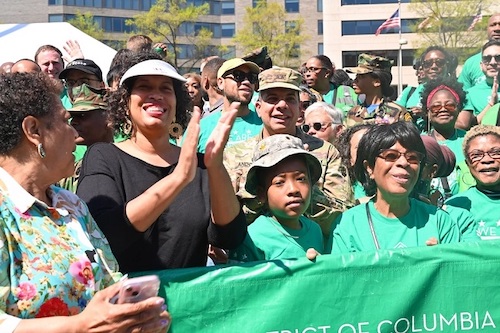 Major General John Andonie, Commanding General of the District of Columbia National Guard, and the 257th Army Band joined Muriel Bowser, Mayor of Washington, for the 2024 Emancipation Day Parade and concert. (The photograph was produced by Master Sergeant Arthur Wright and provided courtesy of the U S Air National Guard, April 14, 2024.)
Major General John Andonie, Commanding General of the District of Columbia National Guard, and the 257th Army Band joined Muriel Bowser, Mayor of Washington, for the 2024 Emancipation Day Parade and concert. (The photograph was produced by Master Sergeant Arthur Wright and provided courtesy of the U S Air National Guard, April 14, 2024.)
Peirspictiochtai Ar An Saol – Gaelic – Irish – for "Perspectives On Life" is a column focused on aspects of accountability and responsibility as well as ways people look at life.
Contact Richard McDonough at
© 2024 Richard McDonough

- Category: Peirspictiochtai
Peirspictiochtai Ar An Saol
Juneteenth
The Emancipation Proclamation
Part Two
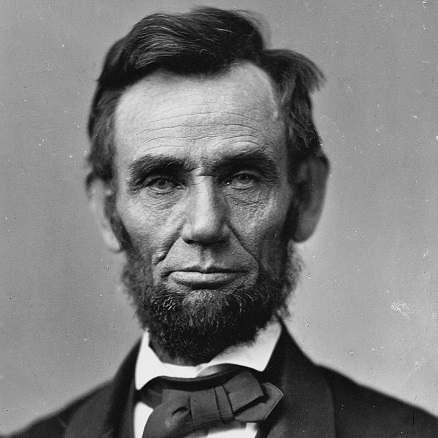 President Abraham Lincoln. (The photograph was provided courtesy of The White House.)
President Abraham Lincoln. (The photograph was provided courtesy of The White House.)
On January 1, 1863, President Abraham Lincoln issued the Emancipation Proclamation.
A transcript of the proclamation from The United States National Archives and Records Administration (National Archives) is as follows:
"By the President of the United States of America:"
"A Proclamation."
"Whereas, on the twenty-second day of September, in the year of our Lord one thousand eight hundred and sixty-two, a proclamation was issued by the President of the United States, containing, among other things, the following, to wit:"
'That on the first day of January, in the year of our Lord one thousand eight hundred and sixty-three, all persons held as slaves within any State or designated part of a State, the people whereof shall then be in rebellion against the United States, shall be then, thenceforward, and forever free; and the Executive Government of the United States, including the military and naval authority thereof, will recognize and maintain the freedom of such persons, and will do no act or acts to repress such persons, or any of them, in any efforts they may make for their actual freedom.'
'That the Executive will, on the first day of January aforesaid, by proclamation, designate the States and parts of States, if any, in which the people thereof, respectively, shall then be in rebellion against the United States; and the fact that any State, or the people thereof, shall on that day be, in good faith, represented in the Congress of the United States by members chosen thereto at elections wherein a majority of the qualified voters of such State shall have participated, shall, in the absence of strong countervailing testimony, be deemed conclusive evidence that such State, and the people thereof, are not then in rebellion against the United States.'
"Now, therefore I, Abraham Lincoln, President of the United States, by virtue of the power in me vested as Commander-in-Chief, of the Army and Navy of the United States in time of actual armed rebellion against the authority and government of the United States, and as a fit and necessary war measure for suppressing said rebellion, do, on this first day of January, in the year of our Lord one thousand eight hundred and sixty-three, and in accordance with my purpose so to do publicly proclaimed for the full period of one hundred days, from the day first above mentioned, order and designate as the States and parts of States wherein the people thereof respectively, are this day in rebellion against the United States, the following, to wit:"
"Arkansas, Texas, Louisiana, (except the Parishes of St. Bernard, Plaquemines, Jefferson, St. John, St. Charles, St. James Ascension, Assumption, Terrebonne, Lafourche, St. Mary, St. Martin, and Orleans, including the City of New Orleans) Mississippi, Alabama, Florida, Georgia, South Carolina, North Carolina, and Virginia, (except the forty-eight counties designated as West Virginia, and also the counties of Berkley, Accomac, Northampton, Elizabeth City, York, Princess Ann, and Norfolk, including the cities of Norfolk and Portsmouth[)], and which excepted parts, are for the present, left precisely as if this proclamation were not issued."
"And by virtue of the power, and for the purpose aforesaid, I do order and declare that all persons held as slaves within said designated States, and parts of States, are, and henceforward shall be free; and that the Executive government of the United States, including the military and naval authorities thereof, will recognize and maintain the freedom of said persons."
"And I hereby enjoin upon the people so declared to be free to abstain from all violence, unless in necessary self-defence; and I recommend to them that, in all cases when allowed, they labor faithfully for reasonable wages."
"And I further declare and make known, that such persons of suitable condition, will be received into the armed service of the United States to garrison forts, positions, stations, and other places, and to man vessels of all sorts in said service."
"And upon this act, sincerely believed to be an act of justice, warranted by the Constitution, upon military necessity, I invoke the considerate judgment of mankind, and the gracious favor of Almighty God."
"In witness whereof, I have hereunto set my hand and caused the seal of the United States to be affixed."
"Done at the City of Washington, this first day of January, in the year of our Lord one thousand eight hundred and sixty three, and of the Independence of the United States of America the eighty-seventh."
"By the President: ABRAHAM LINCOLN
WILLIAM H. SEWARD, Secretary of State."
The National Archives, in a statement, noted that:
"Despite this expansive wording, the Emancipation Proclamation was limited in many ways. It applied only to states that had seceded from the United States, leaving slavery untouched in the loyal border states. It also expressly exempted parts of the Confederacy (the Southern secessionist states) that had already come under Northern control. Most important, the freedom it promised depended upon Union (United States) military victory."
"Although the Emancipation Proclamation did not end slavery in the nation, it captured the hearts and imagination of millions of Americans and fundamentally transformed the character of the war," the statement from the National Archives continued. "After January 1, 1863, every advance of federal troops expanded the domain of freedom. Moreover, the Proclamation announced the acceptance of black men into the Union Army and Navy, enabling the liberated to become liberators. By the end of the war, almost 200,000 black soldiers and sailors had fought for the Union and freedom."
The next edition of Peirspictiochtai Ar An Saol will detail some aspects of emancipation of slaves in the United States of America before the Emancipation Proclamation was issued by President Lincoln.
Peirspictiochtai Ar An Saol – Gaelic – Irish – for "Perspectives On Life" is a column focused on aspects of accountability and responsibility as well as ways people look at life.
Contact Richard McDonough at
© 2024 Richard McDonough
Content on the Beat
WARNING: All articles and photos with a byline or photo credit are copyrighted to the author or photographer. You may not use any information found within the articles without asking permission AND giving attribution to the source. Photos can be requested and may incur a nominal fee for use personally or commercially.
Disclaimer: If you find errors in articles not written by the Beat team but sent to us from other content providers, please contact the writer, not the Beat. For example, obituaries are always provided by the funeral home or a family member. We can fix errors, but please give details on where the error is so we can find it. News releases from government and non-profit entities are posted generally without change, except for legal notices, which incur a small charge.
NOTE: If an article does not have a byline, it was written by someone not affiliated with the Beat and then sent to the Beat for posting.
Images: We have received complaints about large images blocking parts of other articles. If you encounter this problem, click on the title of the article you want to read and it will take you to that article's page, which shows only that article without any intruders.
New Columnists: The Beat continues to bring you new columnists. And check out the old faithfuls who continue to provide content.
Newsletter: If you opt in to the Join GCB Three Times Weekly Updates option above this to the right, you will be subscribed to email notifications with links to recently posted articles.
Editor's Notes
It has come to this editor's attention that people are sending information to the Grant County Beat Facebook page. Please be aware that the editor does not regularly monitor the page. If you have items you want to send to the editor, please send them to editor@grantcountybeat.com. Thanks!
Here for YOU: Consider the Beat your DAILY newspaper for up-to-date information about Grant County. It's at your fingertips! One Click to Local News. Thanks for your support for and your readership of Grant County's online news source—www.grantcountybeat.com
Feel free to notify editor@grantcountybeat.com if you notice any technical problems on the site. Your convenience is my desire for the Beat. The Beat totally appreciates its readers and subscribers!
Compliance: Because you are an esteemed member of The Grant County Beat readership, be assured that we at the Beat continue to do everything we can to be in full compliance with GDPR and pertinent US law, so that the information you have chosen to give to us cannot be compromised.
Submitting to the Beat
Those new to providing news releases to the Beat are asked to please check out submission guidelines at https://www.grantcountybeat.com/about/submissions. They are for your information to make life easier on the readers, as well as for the editor.
Advertising: Don't forget to tell advertisers that you saw their ads on the Beat.
Classifieds: We have changed Classifieds to a simpler option. Check periodically to see if any new ones have popped up. Send your information to editor@grantcountybeat.com and we will post it as soon as we can. Instructions and prices are on the page.










